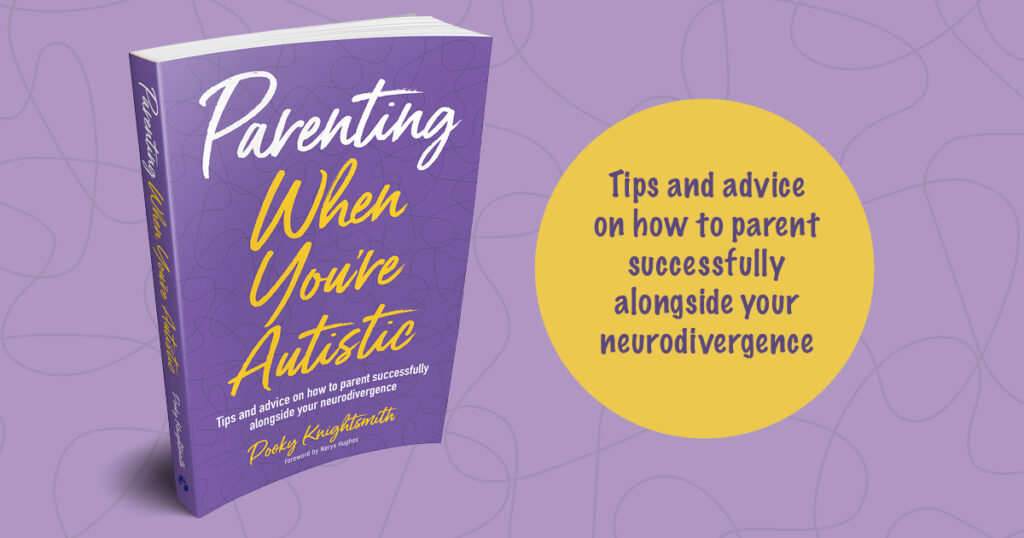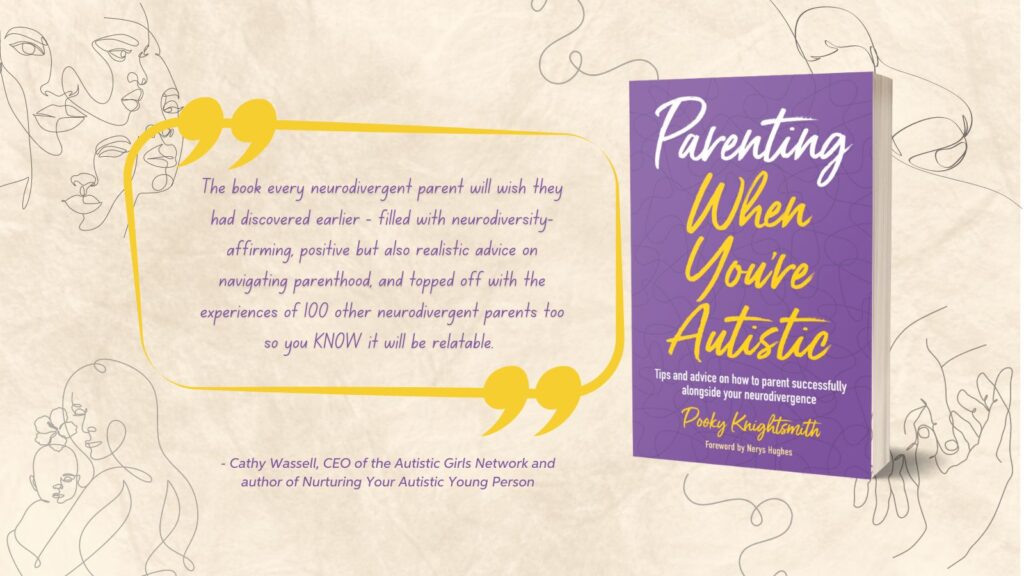In this extract, taken from Pooky Knightsmith’s latest book, Parenting When You’re Autistic, Pooky discusses how the neurodivergent parent can identify and work with their own strengths and challenges, rather than letting comparison get the better of them.

Embrace Being a Successful Neurodivergent Parent, Not a Failed Neurotypical One
It can be easy to compare ourselves to other parents and find that we’re not matching up. There are myriad reasons for this, not least that we’re often comparing our bloopers reel with the highlights reel that everyone else chooses to share whilst their bloopers are left on the cutting room floor. Even so, as a neurodivergent parent we will have different strengths and challenges than our neurotypical peers and we are likely to parent a little differently in consequence. And that’s okay. The very best way to parent is the way that works well for you and your family, regardless of what is ‘typical’ or ‘normal’. Forgiving yourself for doing things the way that works for you and viewing this through the lens of success as a neurodivergent parent rather than failure at attempting a neurotypical route is one way to relieve a lot of the burden of feeling not good enough every day. You are good enough, you just do things a little differently and that’s okay. In fact, it’s more than okay because sometimes the way you do things will be better than the norm.

Five Things You Could Try
1. Ask friends and family about your parenting strengths: Even if you feel like you’re getting it wrong a lot of the time, the chances are that those who live with and love you would be able to tell you about all the things you do get right. We can become quite blind to these in our day-to-day life so actually asking our family or friends can be eye-opening. Whilst it might feel a little bit awkward to ask someone to list out our strengths, it can be both affirming and surprising to hear what they have to say. Many of the parents who contributed to this book did this exercise and wrote me emails of thanks for prompting them to do so as it felt so good. Many of them discovered that some of the things they considered weaknesses were in fact seen as strengths by their children. You can also return the favour and tell a friend or family member about the things that make them a great parent in your eyes. Our neurotypical peers often have a lot of parenting hang-ups too. They may take a different shape than ours but years of working with parents and carers has taught me that many of the really good ones feel like they’re not doing a good enough job.
2. Cleanse your social media feeds: One of the things that can really contribute to the constant feeling of ‘not good enough’ and comparing our parenting with that of others is our social media feeds. Being regularly confronted with the highlights of other people’s parenting journey when we are just about managing to make it through each day can feel like being constantly beaten down. Take a good look at the accounts you follow and ask yourself honestly whether they are net positive or net negative when it comes to your mood and feelings about yourself. Cleansing our feed and removing the accounts that most often make our stomachs twist can make a big difference. You might choose to replace them with people who feel more like your tribe, people who get it and perhaps face similar challenges to yourself or who are simply more honest and authentic in their journey. This exercise might cause you to stop and reflect on who you spend time with in real life as well: if you find that the feeds you most want to delete due to their toxicity are those of people you regularly spend time with, then you might want to quietly consider whether the time you spend with those people is net positive or not. Some people are far more open and honest when you see them face to face, in which case fine. But, just as you don’t have to continue to follow someone on social media if they make you feel terrible, you also do have some agency over who you would most like to spend time with face to face as well.

3. Do more of what you do differently: Everybody parents a little bit differently and that’s okay. Instead of feeling ashamed of the parenting quirks that set you apart from the crowd, lean into them. You’ll have developed your parenting this way for a reason, and if there are approaches that work for you and feel manageable and good, do more of that, regardless of what everybody else seems to be doing.
4. Have a go-to coping statement: Coping statements can be a great way to displace difficult thoughts that circle in our heads. We can sometimes be our own worst enemies as our negative internal narrative is like a bully constantly lurking in the shadows waiting to pounce. Coping statements are phrases we decide upon which present a different viewpoint and which we can repeat again and again in an attempt to diffuse and displace the mean words of our inner bully. For example, if you often find yourself thinking, ‘Why can’t I do this? I’m useless,’ you might counter this with a coping phrase such as ‘I’m not useless, I’m autistic,’ Or ‘I can do this, but I need to be kind to myself first.’
5. Delegate what you don’t do well: If there are other people with whom you are able to share some of the parenting load, it can be helpful to discuss the parts of parenting you find especially challenging. Some tasks that push you to breaking point may feel easier for a partner or parent who might be happy to relieve you of those tasks specifically. Delegating the tasks that you find most physically or emotionally exhausting can mean you are more able to engage with other parenting tasks. If you have a neurotypical partner or fellow parent, it’s quite possible that you’ll find that the bits of parenting that come more easily to you are the bits that they find most challenging and vice versa. This can make these conversations a win–win, with everyone doing more of what they enjoy and excel at whilst passing on those tasks they’d really rather not be doing.
Parenting When You’re Autistic is available now, at JKP.com or wherever you buy books. Check out the ebook and audiobook versions here.